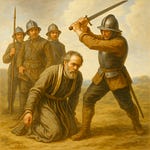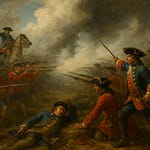Welcome back to This Day in Irish History. I'm your host, Raymond Welsh. Today, we focus on a dark and deeply unsettling moment from January 27, 1999. It was a day that sent shockwaves through Northern Ireland, threatening to destabilize an already fragile peace process: the brutal and mysterious murder of Eamon Collins, a former IRA member who had become one of the most controversial figures of the Troubles.
To understand the significance of Eamon Collins’ death, we need to delve into his life—a life marked by violence, betrayal, and, ultimately, a quest for redemption that made him both a symbol of defiance and a target for retribution. Born and raised in Newry, County Down, Collins grew up amid the sectarian violence that defined life in Northern Ireland during the Troubles. Like many young Catholics of his generation, he was drawn to the Irish Republican Army (IRA), seeking to fight what he saw as systemic oppression and British occupation.
Collins became a dedicated member of the IRA and was heavily involved in its activities, including planning attacks and gathering intelligence. However, his relationship with the organization began to unravel in the early 1980s after he was arrested during an intelligence operation. Under intense pressure, he broke—confessing to his role in numerous IRA operations and naming other members in a move that led to multiple arrests.
This decision marked the beginning of a long and tumultuous journey. Collins later recanted his confession and attempted to reintegrate into the IRA, but he was ultimately deemed untrustworthy by the organization. His life descended into chaos as he faced threats from both the IRA and the British authorities, who no longer trusted him either.
In the 1990s, Collins took the bold step of publicly denouncing the IRA and writing about his experiences in a searing memoir titled Killing Rage. The book was a shocking and unflinching account of his time in the IRA, detailing not only the violence he participated in but also the internal culture of the organization. Collins painted a damning picture of the IRA, describing its ruthlessness, its internal power struggles, and the toll it took on those involved.
Killing Rage was hailed as a powerful and necessary contribution to the literature of the Troubles, but it came at a high personal cost. Collins knew he had painted a target on his back, and his frankness alienated many within his community. He spoke openly about the risk, saying, “I know one day they will come for me.”
That day came on January 27, 1999. Collins was out walking his dogs near his home in Newry when he was ambushed and brutally murdered. His body was discovered with severe head injuries and stab wounds, and the attack was described as “savage” by investigators. The murder was widely believed to be the work of the IRA or individuals connected to the organization, though no one was ever charged.
Collins’ death sent ripples through Northern Ireland’s political landscape. It came at a time when the peace process was still precarious, following the signing of the Good Friday Agreement in 1998. The Agreement, which sought to bring an end to decades of violence, had ushered in a new era of hope, but tensions remained high. Trust between the various factions was fragile, and acts of violence like Collins’ murder threatened to unravel the progress that had been made.
The killing highlighted the challenges of moving beyond a legacy of violence. For many, Collins’ murder was a stark reminder that, despite the optimism of the peace process, old wounds and grudges still festered beneath the surface. His death also underscored the risks faced by those who dared to break with the past and speak out against paramilitary organizations.
To this day, the murder of Eamon Collins remains unsolved, and questions linger about who was responsible and why. Was it a sanctioned act of retribution by the IRA, or was it the work of rogue individuals seeking to settle old scores? The lack of justice for Collins’ family is a painful reminder of the many unresolved issues that continue to cast a shadow over Northern Ireland’s history.
As we reflect on the events of January 27, 1999, we are reminded of the complexities of reconciliation and the enduring impact of the Troubles on those who lived through them. Eamon Collins’ story is one of tragedy and contradiction—a man who was both a perpetrator and a victim, both complicit in and critical of the violence that shaped his life.
Thank you for joining us on this journey through history. Tune in tomorrow for another enlightening episode of This Day in Irish History. I'm Raymond Welsh, Slán go fóill.













Share this post